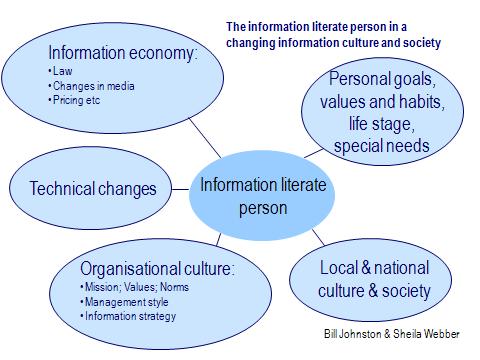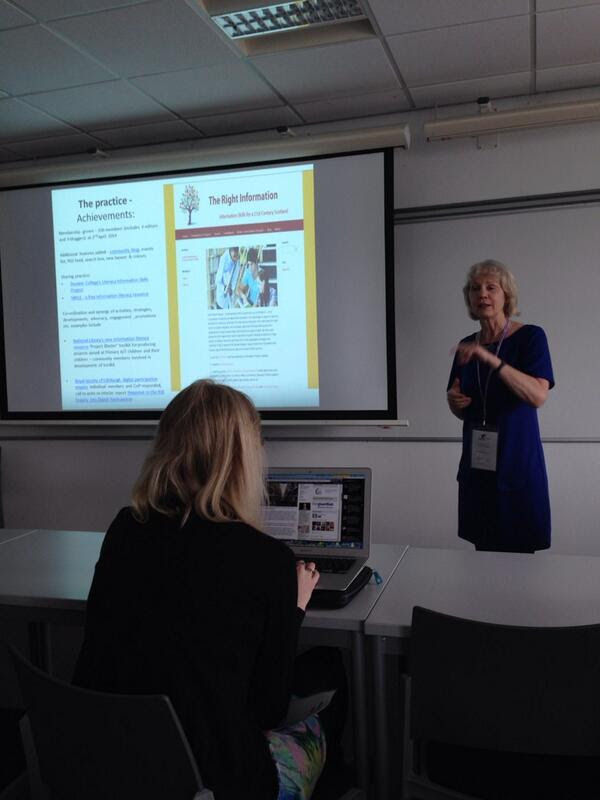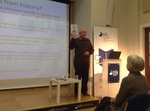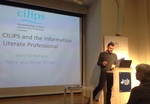Hi All,
Here is my contribution to the Royal Society of Edinburgh's survey on 'Digital participation'. This adds to the contribution John Crawford made and posted here. Honest, we didn't collude!
Bill Johnston
Information Literacy and the Benefits of Digital Participation
Author: Bill Johnston. ( Writing in a personal capacity )
Bio: Bill Johnston is a retired academic and currently an Honorary Research Fellow in the Centre for Lifelong Learning at the University of Strathclyde
Contact: b.johnston@strath.ac.uk
Summary
This short paper proposes that the construct Information Literacy is a vital enabling factor in ensuring that the benefits of digital participation are fully realized. In so doing, the aim is to encourage the Royal Society of Edinburgh to include consideration of Information Literacy in its deliberations and to reflect that consideration in the final report of its’ survey. The main contention is that with Information Literacy digital participation will be enhanced, and the potential benefits increased. However without Information Literacy, the benefits of digital participation will be significantly diminished.
Under the present conditions of everyday practice, formal education, occupational training, public services, and the current level of technological development, there is no certainty that people will develop the necessary Information Literacy to fully participate in the online society and information culture of the 21st century. Consequently Information Literacy needs to be more fully developed through a variety of contexts in education, workplace activity, communities and participation in lifelong learning generally, in order to maximize social and personal investment in digital technology and services.
The paper concludes by suggesting a discussion of the benefits of digital participation by engaging with the complementary narrative of Information Literacy via two related questions:
- To what extent is Scotland an Information Literate society?
- How are more Scots to become Information Literate citizens?
1. The starting premise of this paper is that digital information is a key learning, employment, cultural and everyday life resource for all citizens, which takes visible form in websites, emails, texts, internet searches, blogposts, social media and many other channels. These relatively new channels complement the rich pattern of information channels such as books, newspapers, personal communications and other social forms, which have sustained cultural participation over the centuries. For citizens to fully benefit from digital participation in 21st century culture it is essential that they not only have access to a base level of relevant technology and online systems, but that they also develop knowledge and skills in creating, accessing and managing the information processes and content represented in their digital technologies and devices. In effect the ‘literacy’ of online digital activity is perceived here as the literacy of information, hence the use of the term Information Literacy.
2. Information Literacy is an established, research-based construct and an area of practice in education, public services and workplaces. Information Literacy can be described as follows:
" Information literacy is the adoption of appropriate information behavior to obtain, through whatever channel or medium, information well fitted to information needs, leading to wise and ethical use of information in society”.
(Johnston, B. and Webber, S. 2003)
This description of Information Literacy (IL hereafter) relates to personal aspects of information behaviour, whilst also highlighting the importance of information to society and the economy. Thus IL can be narrowly conceived in terms of the techniques of accessing sources, formulating searches, selecting relevant material for a given purpose and associated skills. This is a perspective, which has traditionally been associated with the interests of librarians, teachers, researchers, students and a wide range of professional occupations. There is a growing body of knowledge to guide the practice of all of these groups.
2.1 The aspects of the description referring to “wise and ethical” use of information expresses a broader conceptualization and aligns more with the interests of specialist researchers and professional advocates for IL as a powerful social force. This includes bodies representing professional librarians and major world organizations such as UNESCO. In virtually all specialist formulations and commentaries IL is typically linked to development of critical thinking and employability; IL is also typically seen as an essential aspect of lifelong learning.
2.2 These perspectives offer powerful foci for considering the nature of digital participation and indeed in identifying what some of the benefits might be.
3. For digital participation to be fully realized it is therefore vital that people develop IL, becoming in effect “Information Literate Persons”. A person’s IL will develop over life and change according to circumstances and influences, as illustrated in fig. 1 below. This diagram places the person at the centre of five powerful vectors and suggests that a person needs to be able to identify their levels of IL in each area and adjust their levels and approaches as circumstances demand in line with their own aspirations.
Figure 1: The Information Literate person in the changing information culture and society

3.1 Much contemporary commentary and debate seems to assume that changes in digital technology is the dominant force in modern society and that it is the availability of the Internet, digital devices and social media, which increasingly conditions our lives. However as fig.1 indicates the situation is more complex and involves people in knowing about the connections between technological change and other areas of life, society and economy. Cultural awareness and sensitivity to changes in contexts within educational institutions and workplace organizations, or in the exercise of legal rights and obligations etc. are essential features of becoming an information literate person.
3.2 These personal characteristics are unlikely to develop to the full as a consequence of interacting with a given device, search engine or social media tool, since these technologies do not as yet fully support all of the personal knowledge, skills and metacognitive strategies required by people in their various information related roles. Consequently systematic external support is needed to let people fully participate and benefit from digital resources.
3.3 For example, it is increasingly common for people to have to deal with complex information as consumers, students, employees, clients, patients, welfare claimants, community activists, voters and so forth. It is equally common for people to seek and retrieve information from the Internet using their digital device of choice, thereby engaging with very complex digital information environments, which present seemingly unlimited choice. What information is best suited to my need? Is it reliable and accurate? Have I got enough? How do I judge between competing sources? What does information I’ve retrieved add to what I’ve been told by an authoritative source like my GP?
3.4 Equally critical are questions raised when people contribute information via social media, mobile ‘phones and so on. Who owns my information? Can I remove my information when I want to? Am I breaking any laws if I criticize somebody online? What happens to my digital output if I am made redundant/retire? Is the state collecting information about me from my digital communications? Does the state have a right to do that? Is my information being gathered by agencies in other countries and do they have a right to do that? How can I best present myself online?
3.5 These questions are key to everyday digital interactions for many millions of individuals and the cost of making ineffective decisions is a reduction in the benefit of digital participation in the online world. It is questions like these that IL specialists can help people answer by providing, as a minimum:
- insight into the complexities of digital participation;
- curriculum for IL through all stages of education and lifelong learning;
- examples of practical initiatives and interventions across a range of contexts, which can be ‘scaled up’ or ‘spread around’ to disperse benefit.
By these means a scheme of ‘external support’ can be developed to help people maximize their digital participation and increase their range and quality of benefits. The institutions of education, workplace development, community resources etc. can all be renovated to achieve these aims, and encouraging that renovation should be a key element in promoting a successful digital Scotland.
4. In conclusion I would like to suggest that the Royal Society of Edinburgh explores the benefits of digital participation by engaging with the complementary narrative of Information Literacy. To that end I suggest two key questions for discussion:
- To what extent is Scotland an Information Literate society?
- How are more Scots to become Information Literate citizens?
Debating these questions should add value and interest to the consideration of the benefits of digital participation in 21st century Scotland
Bill Johnston
June 2013
Further Reading
Anderson, T., Johnston, B. and McDonald, A. (2013). “Information literacy in adult returners to Higher Education: student experiences in a university pre-entry course in a UK university. Library and Information Research Vol. 37, No 114. http://www.lirgjournal.org.uk/lir/ojs/index.php/lir/issue/view/65
Bindé, J. (2005) Towards knowledge societies. Retrieved August 10, 2012 from http://unesdoc.unesco.org/images/0014/001418/141843e.pdf
Bruce, C. (2008) Informed learning. Chicago: Association of College and Research Libraries.
Cheuk, B. (2008) Delivering business value through information literacy in the workplace. Libri, 58(3), 137-143.
Crawford, J. and Irving, C. (2009) “Information Literacy in the workplace: a qualitative exploratory study”. Journal of librarianship and information science, 41(1), 29-38.
Hepworth, M. & Walton, G. (2009). Teaching information literacy for inquiry-based learning. Oxford: Chandos.
Irving, C. (2011). “National information Literacy Framework (Scotland): Pioneering Work to Influence Policy Making or Tinkering at the Edges”. Library Trends, 60 (2), 419-439
Johnston, B. and Webber, S. (2003) “Information literacy in higher education: a review and case study.” Studies in higher education, 28 (3), 335-352.
Johnston, B. and Webber, S. (2006) “As we may think: Information Literacy as a discipline for the information age”. Research strategies, 20 (3), 108-121.
Lloyd, A. (2009) Informing practice: information experiences of ambulance officers in training and on-road practice. Journal of Documentation, 65(3), 396-419
Lupton, M. (2004). The Learning Connection: Information Literacy and the Student Experience. Adelaide, Auslib Press
National Forum on Information Literacy (2006) Beacons of the information society: the Alexandria proclamation on information literacy and lifelong learning. Paris: UNESCO. http://www.unesco.org/new/en/
Secker, J. & Coonan, E. (2011) A new curriculum for Information Literacy: curriculum and supporting documents. http://ccfil.pbworks.com/f/ANCIL_final.pdf
UNESCO (2003). The Prague Declaration – “Towards an information literate society”. Available: http://portal.unesco.org/ci/en/ev.php-URL_ID=19636&URL_DO=DO_PRINTPAGE&URL_SECTION=201.html Accessed : 06 June 2011.
Webber, S & Johnston, B. (2000) Conceptions of information literacy: new perspectives and implications". Journal of Information Science, 26(6), 381-397.
Webber, S. and Johnston, B. (2013) “Transforming Information Literacy for Higher Education in the 21st century: a Lifelong Learning approach.” In: Hepworth, M. and Walton, G. Developing people’s information capabilities: fostering information literacy in educational, workplace and community contexts. Emerald. [in press]
Welsh Information Literacy project (2011) Information literacy framework for Wales: Finding and using information in 21st century Wales. Retrieved August 10, 2012 from http://librarywales.org/uploads/media/Information_Literacy_Framework_Wales.pdf
QUESTIONS
Benefits
1. What do you think are the current benefits of digital participation and using the internet?
Increased potential for learning, social empowerment, economic activity and cultural change.
2. What are the potential benefits?
Many more people having the opportunity to participate in more sophisticated and satisfactory ways. Cities, rural areas and other communities having the opportunity to project and cohere themselves online.
3. How can the benefits be maximised?
By implementing a substantial and thorough programme to develop Information Literacy as a concomitant of digital activity.
4. How can the benefits be promoted?
Firstly by clear public policy leadership.
Secondly by leveraging existing expertise.
Thirdly by instituting a strategic approach to engaging the Scottish population and civil society.
5. How could Scotland benefit from wider digital participation and use of the internet?
By establishing itself as a world leader in the sophisticated use of digital technology and by innovating internet use as a progressive global resource. At present it seems that the larger agenda is dominated by a mixture of commercial interests, state agencies and increasingly by protest movements. Scotland has an opportunity to add a new dimension of activity by harnessing the internet to the growing sense of nationhood post-devolution. A lot might depend on the Referendum outcome, but in any case there should be opportunities to link more fully with the Scottish Diaspora.
Obstacles
6. What risks do you associate to digital participation?
The misuses are becoming more obvious and hardly need listing, but our capacity to intervene as a society still seems to be lagging behind.
7. How can such risks be addressed?
Partly by legal, regulatory and policing mechanisms. However a greater degree of maturity and ethical awareness needs to develop across society. All areas of civil society have a role to play, but it is not clear where leadership and co-ordination might best reside.
8.What prevents you from using digital technologies and the internet?
Lack of time, availability of technical support etc. It should be noted however that usage is a matter of choice and also only one of a variety of activities in life.
Incentives
9. What could be done to increase your use of digital technologies and the internet?
Create new contexts, which harness the conviviality of a wifi café, the focus of a seminar and the impact of a mass movement.
10.What incentives could be used to increase digital participation?
For me, establishing a link to creativity to balance the present disproportionate emphasis on the promotion of ‘new’ ‘revolutionary’ technological devices, applications and configurations. MOOCs being only the most recent manifestation of this seemingly relentless process.
Bill Johnston (b.johnston@strath.ac.uk )
June 2013
 Monday, April 28, 2014 at 9:47AM
Monday, April 28, 2014 at 9:47AM  Christine Irving, LILAC 2014
Christine Irving, LILAC 2014


